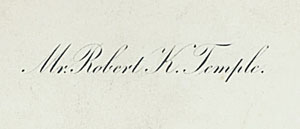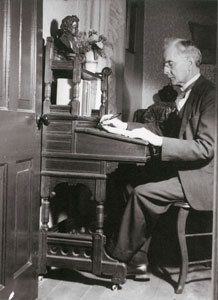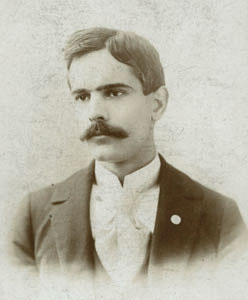This is my grandfather Robert Kyle Temple, in 1943 or 1944, shortly before his death. He had an extremely rare blood type, and when he had a haemorrhage after an operation, there was not a single pint of that type to be found anywhere in the state of Virginia, because it was all in the South Pacific for our troops who were fighting the Japanese. He therefore bled to death for lack of a simple transfusion.
Here he is sitting at his father’s writing-desk, with the bronze bust of his favourite composer, Beethoven, looking down on him. I still have the chair. My grandfather was very musical, and sang solo parts in oratorios. He was a leading singer of the Orpheus Society of Cincinnati as a young man. He was a baritone when younger, but deepened to a bass when older. He was a constant concert-goer, and always carried with him the score of every piece of music being played. He could readily follow all the instrument parts in the symphonies, and read scores like newspapers. To him, it was a compulsion to follow the scores while listening, in order to experience the music fully.
From the musical point of view, his favourite years were those in Philadelphia, where he could attend the concerts of the Philadelphia Symphony Orchestra under Stokowski. My grandfather wore a wing collar every day of his life except when he was engaged in gardening or some manual labour aspect of supervising the farm (or digging postholes, which he enjoyed doing himself). He was a spectacular master of the art of grafting. His favourite rose was the American Beauty (the American name of the old French rose Madame Ferdinand Jamin,1875), and he was so enthusiastic about this rose that he grafted two thousand of them onto his apple trees, which greatly startled visitors, to see all those roses literally growing out of the trees as they came up the drive to his house. He did everything horticultural en masse. When he decided to plant some vines, he planted 500. Most people would call that a vineyard, but because my grandmother was a fanatical teetotaller and would not allow him to make wine, he was forced to sell the whole crop as raisins, which was a misery to him. He used to sneak a drink from time to time, poor fellow, but my grandmother was very dominant, and if there was one thing that she could not stand, it was drinking. I am glad I did not inherit that!
When my grandfather liked a tie, he would always buy six identical ones. When my grandmother asked him why he needed more than one of the same tie, his answer made perfect logical sense: ‘Because I like it.’ He was a brilliant engineer and inventor. He invented the coupling mechanism which was used to join all the railway cars in the world apart from the British ones. (It’s the one that looks like two hands joined and locked.) He designed and installed the waterworks for the cities of Indianapolis and Gary, Indiana, and designed numerous bridges. He built the first crystal radio set in the state of Virginia, and was reputed to be the first man in Virginia who could understand Einstein’s Theories of Relativity. He invented a colour photography process at an extremely early date, long before any was commercially produced. One of his most noted inventions was a simple but ingenious improvement to the centrifugal flyball governor, which brought the device to perfection at last. It had originally been invented for regulating the speed of a steam engine, by James Watt in 1788, and James Clerk Maxwell had made it more stable in 1868. As a result of my grandfather’s work, I believe locomotives became more efficient. I have a picture of the invention, but lack the engineering expertise to analyse it properly. However, I believe this device was especially applied to submarines or torpedoes, because my grandfather designed both. His scientific work for the Navy was secret.
He also invented the first truly economic machine to mass-produce cigarettes, which he did for one of the big national tobacco companies in Virginia or North Carolina. Alas, that is worse than inventing the atom bomb, to someone who hates smoking as much as I do! My grandfather puffed on a pipe now and then, but never smoked a cigarette. I still have a lemonwood long bow which my grandfather made personally with great care over many months, having imported the wood specially from South America, as it was the best wood for the purpose, better even than English yew. He wished to make the strongest possible long bow, but I have never strung it, as I am not an archer as he was. My grandfather took fly fishing very seriously, and had the most amazing collection of colourful flies. He literally had hundreds of them, which he had made himself from tropical bird feathers. The trout must have been dazzled by all this finery, and they must all have bit. I would have done! I used to pour over this collection as a little boy, astounded at the brilliant and fascinating colours of the feathers, and the meticulous care with which the flies had been made.
 Like myself, my grandfather was a passionate dog lover, and also like myself could never bear to shoot an animal, so he restricted himself to target shooting, as I have done (except I have to confess I once got so irritated by some starlings in the roof that I shot several with my .22, which he would never have done). My grandfather was once cheated out of a gigantic fortune of hundreds of millions of dollars by a partner, and could easily have obtained redress in the courts, but when my grandmother kept urging him to sue the man, his reply was simply: ‘A gentleman does not sue. Let him keep his ill-gotten gains, which will only make him miserable.’ I show my grandfather’s calling card, of which only one survives. He was the oldest of three children, and as he was left an orphan at the age of 11, he was very traumatised by that and was introverted, quiet and retiring all his life. He was extremely formal, totally honourable, and probably never told a lie or did anything wrong even once in his lifetime. As a young boy, he had designed and constructed elaborate rafts on which he and his brother and sister, and their cousins, and Sydney Durst and his childhood sweetheart Clara Saunders (who later married each other in old age after my Aunt Mame died, who had married Sydney first because Clara did not want to marry when young, but wanted to travel the world as an artist, which she did), sailed considerable distances on the Ohio River, dodging steamboats as they went. They sailed forth in the rafts from one of the family homes at New Richmond, in Clermont County, the property inherited by Uncle Ira Temple, where my cousins the Motch Family now live. Although the houses are up on the hill, the property runs all the way down to the river through woods. They discovered a little island which they colonised, to live out their Huckleberry Finn fantasies. My grandfather’s favourite book was Mark Twain’s Life on the Mississippi.
Like myself, my grandfather was a passionate dog lover, and also like myself could never bear to shoot an animal, so he restricted himself to target shooting, as I have done (except I have to confess I once got so irritated by some starlings in the roof that I shot several with my .22, which he would never have done). My grandfather was once cheated out of a gigantic fortune of hundreds of millions of dollars by a partner, and could easily have obtained redress in the courts, but when my grandmother kept urging him to sue the man, his reply was simply: ‘A gentleman does not sue. Let him keep his ill-gotten gains, which will only make him miserable.’ I show my grandfather’s calling card, of which only one survives. He was the oldest of three children, and as he was left an orphan at the age of 11, he was very traumatised by that and was introverted, quiet and retiring all his life. He was extremely formal, totally honourable, and probably never told a lie or did anything wrong even once in his lifetime. As a young boy, he had designed and constructed elaborate rafts on which he and his brother and sister, and their cousins, and Sydney Durst and his childhood sweetheart Clara Saunders (who later married each other in old age after my Aunt Mame died, who had married Sydney first because Clara did not want to marry when young, but wanted to travel the world as an artist, which she did), sailed considerable distances on the Ohio River, dodging steamboats as they went. They sailed forth in the rafts from one of the family homes at New Richmond, in Clermont County, the property inherited by Uncle Ira Temple, where my cousins the Motch Family now live. Although the houses are up on the hill, the property runs all the way down to the river through woods. They discovered a little island which they colonised, to live out their Huckleberry Finn fantasies. My grandfather’s favourite book was Mark Twain’s Life on the Mississippi.
My grandfather was a 32nd degree Mason, and turned down the request from the Supreme Council that he agree to become a 33rd degree Mason (known as a Grand Inspector-General), because the national duties at headquarters in Washington, D.C., which was also the Mother Supreme Council for the World for the Scottish Rite, were too costly, onerous and time-consuming. However, he introduced young Ted Webber (Charles E. Webber), whom he knew in Virginia, into Masonry by sponsoring him, and Ted went on to become a 33rd degree Mason at the Supreme Council, which would have made my grandfather very happy, if he had lived to know of it. It was Ted who introduced me into Masonry, by writing to the Grand Lodge in England, a chap called ‘Brother Higham’, who seemed a bit put out by it, but put me forward nevertheless. However, after going through the three degrees, I became inactive, as it really is too time-consuming to be an active Mason, and they rely on you to be there at certain dates, which I cannot possibly do. However, all the Masons I met seemed to be very fine fellows, and they do a tremendous amount for charity, so it is all a very good thing as far as I can make out. I have forgotten the handshakes, I am afraid.


